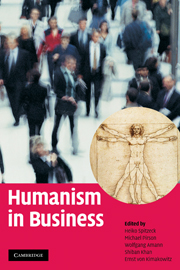Book contents
- Frontmatter
- Contents
- List of figures
- List of tables
- List of editors and contributors
- Acknowledgements
- Humanistic Management Network: paving the way towards a life-serving economy
- Introduction
- Part 1 Philosophic-historical grounding of humanism
- Part 2 Towards an integration of humanism and business on a systems level
- Part 3 Humanistic management
- 13 Democratizing the corporation
- 14 Social entrepreneurship: a blueprint for humane organizations?
- 15 Humanism at work: crucial organizational cultures and leadership principles
- 16 Positive organizational scholarship: embodying a humanistic perspective on business
- 17 Corporate sustainability as an indicator for more humanism in business? A view beyond the usual hype in Europe
- 18 Changing direction: corporations as ambassadors for the environment?
- Part 4 The individual as a change agent for a humane business society
- Index
- References
15 - Humanism at work: crucial organizational cultures and leadership principles
Published online by Cambridge University Press: 25 January 2011
- Frontmatter
- Contents
- List of figures
- List of tables
- List of editors and contributors
- Acknowledgements
- Humanistic Management Network: paving the way towards a life-serving economy
- Introduction
- Part 1 Philosophic-historical grounding of humanism
- Part 2 Towards an integration of humanism and business on a systems level
- Part 3 Humanistic management
- 13 Democratizing the corporation
- 14 Social entrepreneurship: a blueprint for humane organizations?
- 15 Humanism at work: crucial organizational cultures and leadership principles
- 16 Positive organizational scholarship: embodying a humanistic perspective on business
- 17 Corporate sustainability as an indicator for more humanism in business? A view beyond the usual hype in Europe
- 18 Changing direction: corporations as ambassadors for the environment?
- Part 4 The individual as a change agent for a humane business society
- Index
- References
Summary
Globalization, technological developments, and insecurity regarding the stock market pose considerable challenges for today's organizations. In light of these challenges many managers argue that, in principle, they would like to give employees more room for development and creativity, but must focus on efficiency and cost-cutting. But do humanistic principles and superior business performance really contradict each other? This chapter presents organization cultures that are based on humanistic principles and have been implemented by numerous successful organizations.
In the first part of this chapter we briefly present the philosophical foundations of our approach. Subsequently, we describe how the philosophers' claims can be met in modern organizations. Specifically, we present organizational cultures – the center of excellence cultures – that can be used to implement humanistic principles and have been realized by many exceptional organizations. To illustrate these organizational cultures we provide examples of ways in which well-known business organizations have implemented these organizational cultures. Finally, we present guidelines for managers on how to create the center of excellence cultures in their own organizations, i.e. the principle-based model of leadership.
Philosophical foundations
Fundamental for creating humane organizations are the philosophies of Immanuel Kant (1724–1804), Gotthold Ephraim Lessing (1729–81), and Karl Popper (1902–94).
Kant, a major philosopher of the Enlightenment, stressed man's emergence from his self-imposed immaturity. He emphasized that humans have to “dare to know” (Latin: sapere aude), to think autonomously, i.e. free of the dictates of external authority, to free themselves from immaturity and dependence.
- Type
- Chapter
- Information
- Humanism in Business , pp. 260 - 277Publisher: Cambridge University PressPrint publication year: 2009
References
- 12
- Cited by



